“He must have had a plan — and it must have been diabolical!”
The one great misconception that everyone believes about Dark Shadows is that the lead vampire, Barnabas Collins, gets “redeemed” once the show reveals how he was cursed to become one of the living dead. The idea is that Barnabas started out on the show as a cruel, remorseless villain, but then we go to the 18th century to see his backstory — and by the time we come back, he’s become “sympathetic,” and we’re supposed to like the guy.
In fact, Barnabas’ only real pivot in 1968 is that he starts out as a partially inept villain, and becomes a totally inept villain. Apparently, if you’re bad enough at being a bad guy, you can circle back around to good guy.
Here’s the current state of play: Barnabas was planning to sacrifice Maggie Evans, the nicest girl on the show, in a black-magic mad science experiment to bring a female Frankenstein monster to life. Barnabas’ henchman, Willie, wanted to save Maggie’s life, so he kidnapped her and hid her in the secret room of the Collins mausoleum until the whole thing blew over.
Trapped and terrified, Maggie’s suppressed memories returned, and now she remembers that Barnabas abducted her last year, and planned to kill her and turn her into an undead sex toy. That was several weeks ago, and since then the situation has not noticeably improved.
At the start of today’s episode, Willie rushes into the Old House with the stop-press announcement that Maggie has escaped from confinement, and is now stumbling in the direction of the authorities.
Barnabas puts on his cape, and says that they’ll have to find her before she reaches town. Willie says, “You’re not going to hurt her, are you?” and Barnabas growls, “Let’s just find her, Willie,” because Barnabas is a hero now, and super sympathetic and so on.
Maggie has a head start, but she’s not in peak physical condition. She’s been trapped in a drafty stone room for at least a couple of days, with no food or sleep, except when Willie knocked her out with chloroform.
But she’s a soap opera heroine, a particularly resilient breed, and she’s mustering the strength to find her fiancee, Joe.
And now here’s the bad news about Joe, who’s having some undead problems of his own.
He’s under the spell of Angelique, a whole other vampire who comes over pretty much every night to drink his blood and carpet-bomb his love life. It’s been a rough couple of months for these two.
All of this is leading up to one of the great dramatic moments of our time, when Maggie is running away from one vampire, and finds another one in the process of snacking on her boyfriend.
Maggie faints, and Angelique disappears, and we’re left with this amazing scene.
Joe: I wish I could tell you who she was… I wish I could tell you what she’s doing to me, but I can’t.
Maggie: Joe… I can understand.
Joe: What?
Maggie: I know what she is! I know what she’s been doing to you!
Joe: How could you possibly know that?
Maggie: Because the same thing happened to me.
Joe: What are you saying?
Maggie: I’ve been attacked — the same way!
Joe: Maggie!
Maggie: Joe… we’ve got to escape. Both of us! We’ve got to get out of this town!
Joe: I — I don’t think I can, Maggie. I don’t think I can escape her. Not now.
Maggie: Joe, you’ve got to try! We’ve got to get to your car, and drive — just drive, as far away from this town as we can!
“Escape… yes,” Joe breathes, and he helps her up off the bed. They’re going to try it — a mad dash for the turnpike, a high-speed chase with the forces of darkness snapping at their heels.
There’s a knock at the door.
And then everything is fine.
A couple scenes later, Barnabas and Willie show up at Maggie’s house, and there she is, back at home and none the worse for wear. She greets them as old friends, and engages in some idle chatter about the portrait of Barnabas that her father painted last year.
She’s forgotten everything — the abductions, the mausoleum, the vampire bites, the horror, the desperate need to drive, just drive, as far away from this town as we can. The whole deal.
Once again, the show treats Maggie like an Etch A Sketch — tormenting her, pushing her to her limits, just good classic soap heroine material — and then they turn her upside down and shake her a few times, and erase everything.
It’s Nicholas Blair, of course. These days, it’s always Nicholas Blair. The evil warlock has become an all-purpose demon ex machina, hypnotizing people and erasing any inconvenient story progression. We saw Carolyn mind-wiped just yesterday, and today it’s Maggie’s turn.
So I think this is it — the moment when Ron Sproat actually breaks the show. He has violated the ancient truce between the writers and the audience.
Sproat is currently the senior member of the Dark Shadows writing team. He’s been working on the show since November 1966, back when it was totally okay to end an episode with Vicki sighing and looking out the window.
He’s done some good work on the show — he was part of the team that introduced Barnabas in the first place, and made the vampire into such an engaging character that Dark Shadows suddenly blossomed into a blockbuster hit.
But Sproat still believes in using the same old tricks — locking characters up for weeks, erasing their memories, setting up dramatic confrontations and then lunging for the reset button. It’s really long past time to put those dusty old techniques away. The show has changed, and he should know that by now. He’s the guy who changed it.
Like Maggie, the show has been running in circles lately — running toward the door, and then doubling back and forgetting what they were trying to do in the first place. That’s because there’s a war going on in the writers’ room.
Ron Sproat, Sam Hall, Gordon Russell and executive producer Dan Curtis are all struggling to figure out what to do with the show, and what shows up on screen is the muddled result of a string of half-hearted compromises. Dark Shadows is contested territory.
This battle will go on for several months, and it’s the kind of fight where not everybody walks out alive. Some of them weren’t even alive to begin with.
Tomorrow: The Mate That Fate Had Me Created For.
Dark Shadows bloopers to watch out for:
When Barnabas and Willie are looking for Maggie, Barnabas gets stuck on the phrase “How do you know”:
Barnabas: How did she escape?
Willie: It was David!
Barnabas: David?
Willie: David! He found her, and he let her go!
Barnabas: How do you know?
Willie: Well, he was in the mausoleum, he was playin’ around. He found her there, and he let her go. He admitted it to me.
Barnabas: You’re lying, Willie.
Willie: Lyin’?
Barnabas: You let Maggie escape.
Willie: Me?
Barnabas: Yes! I know how you feel about her. You took pity on her, and let her escape. Then you thought over what you had done, and panicked, and came back with that ridiculous story about David.
Willie: Barnabas, it’s not a story, it’s the truth!
Barnabas: How do you know that?
(They look at each other. Barnabas realizes he’s said the wrong line, and looks at the teleprompter. The scene continues.)
Barnabas: David just wandered into the mausoleum, and opened the panel. Do you expect me to believe that?
Willie: No, Barnabas, it isn’t the way it happened. He was curious — he saw me comin’ out of the mausoleum, that’s why he went inside!
Barnabas: And once he got inside, how did he open the panel? He doesn’t even know it’s there. He doesn’t know it exists!
Willie: He does, Barnabas.
Barnabas: How do you know that?
(Willie looks distracted. It’s obviously the wrong cue.)
Barnabas: How did he find out?
When Joe is sitting on his bed, you can see Angelique standing in the shadows behind him, waiting for her cue.
Another moment of Fridspeak:
Barnabas: I only know that someone has been helping me — first with Carolyn, and now Maggie. And it must be Blair.
Willie: Why would he help you, Barnabas? I mean, it just doesn’t make sense.
Barnabas: We only have — this done for a reason.
Tomorrow: The Mate That Fate Had Me Created For.
— Danny Horn



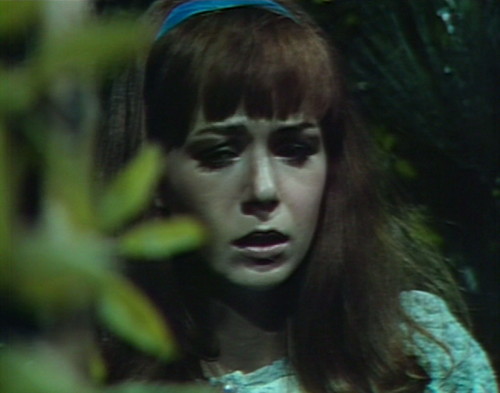
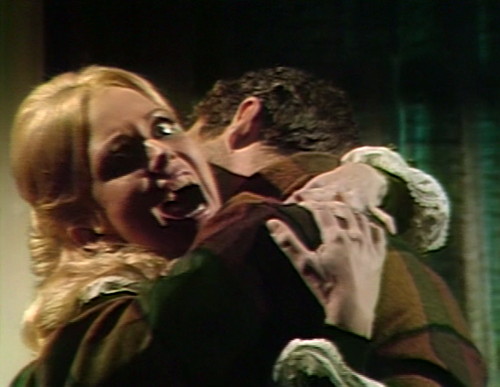
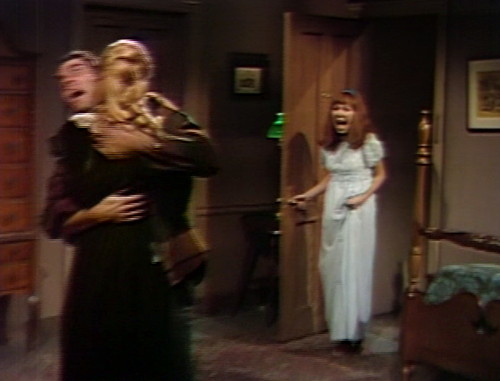



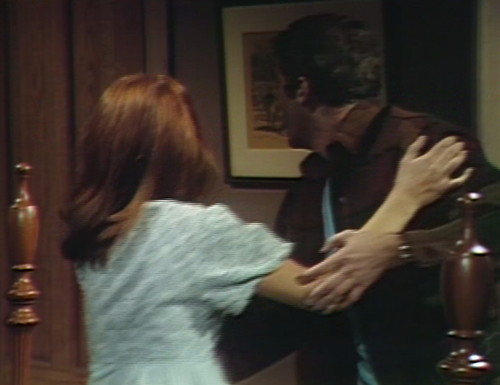
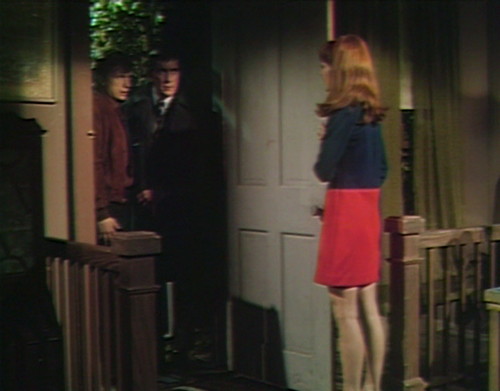


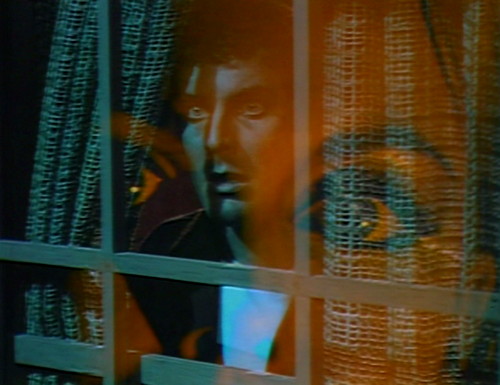
I think there are two major shifts in the series regarding Barnabas. The first is when Dr. Woodard is killed (or Wood-AAARD as Ben Cross pronounced the name, which is reason enough to dislike his performance). This is when Barnabas ceases to be the antagonist of the series and is now the series protagonist. The show had been building up to a satisfying conclusion — all appeared to be lost for the heroes (Woodard was dead, Burke appeared to be dead, and once the experiment to cure Barnabas failed, he had committed himself to not only being a vampire but turning Vicki into one, as well). Dramatically,the expectation would be that Burke would suddenly appear at the eleventh hour to stop Barnabas and walk off into the sunset with Vicki. But this never happened. The show had gone past the point of return and Barnabas was the lead.
Of course, the show started to spin in its wheels because despite his popularity, what could you do with a villainous lead? Especially without a true heroic foil? They killed his Van Helsing, after all. And the series seems confused as to who we should be rooting for. Probably not co-accomplice Julia. When I first watched, I thought it might be Tony Peterson as a “replacement” for Burke Devlin but this time, the enemy of the Collins falls for Carolyn and not Vicki.
After Barnabas meets Dr. Lang, the series begins to treat him more favorably — as if he’s our romantic hero but without his really earning the distinction. It’s a lot of telling but not showing. And the bulk of 1968 suffers because Barnabas is written as a lousy protagonist — he doesn’t seem to really want anything. He only reacts, which is no different from the position he was in during the lowest point of his villain tenure but he’s just, as Danny points out, more inept.
That’s why I think the second shift in the series involves Chris Jennings and Quentin Collins. Barnabas starts to become engaged in the family and in others for reasons not solely related to his own personal interests. When Barnabas chooses to spare Vicki from the dream curse, he does this because he loves her and doesn’t want to see her in pain yet he never really cared that much about how the dream affected anyone else. These actions were well within the reach of your standard narcissist or sociopath. But when Barnabas risks his life by entering the I-Ching to save David Collins (a child he was trying to kill just a year or so earlier), he is prioritizing someone else’s well being above his own for no immediately apparent gain.
Then, alas, a few months later, he brutally murders a family member. He’s a complicated man.
But as an antihero and the series protagonist, he will have clear objectives and goals that aren’t reactive for the remainder of the series.
I’ve found that it helps if you stop thinking in terms of heroes and villains, and just think about who’s interesting to look at. Serialization is natural selection for narrative, especially in terms of which characters the audience wants to see. We’re not rooting for the characters to succeed, we’re rooting for the camera to be pointed at the people we want to look at.
Barnabas is showing signs of his broader concern for others–the Collins family members–in the midst of the muddle of the Adam storyline. He often says that he and Julia must create a mate to prevent Adam from harming “the family,” not just Vicki.
Adding insult to injury, didn’t David already know about the secret room in the mausoleum anyway? I mean, he was trapped in there for a couple of days if I remember. And I think Barnabas knew that David knew, which is on of the reasons he was trying to kill him. And yes, it’s a soap and this happened a year earlier and things have changed but this is all within context of recalling a storyline that took place a year earlier, so some narrative consistency is not uncalled for.
Danny, do you know of any specific debates happening in the writers’ room at this point? IE. did one writer specifically want to go in one direction and was shot down by another? Also would be curious to know how much control each individual writer had within their own scripts – did they all agree to a general storyline for the week and then go off to do their own episodes? I assume they would nonetheless need to pass their scripts by Dan Curtis for approval but I suppose with the schedule they were on some things like plot inconsistencies may have squeaked by.
I just wrote a long response to your question, and then realized it was actually a blog post. So I think I’m going to hold on to it, and then post it as an entry. If I’m going to go deep into this Last Days of Sproat theme, then I should probably take a second to explain what I know of how the writing team worked.
So — thank you, Pedro! 🙂 That was a perfect question to ask, and you’ll see my imperfect answer sometime soon.
I kind of thought it might be addressed at some point in the future so happy to wait!
The scenes between Maggie and Joe are just brilliant. For viewers, it’s like we’re being treated to a seven-course meal we’ve been promised for over a year – and then they snatch the tray away and tell us to suck on crumbs.
How incredible – how daring would it have been to show Maggie fighting for Joe’s sanity and life against the supernatural forces of Collinwood? DS would have a truly proactive heroine. One can imagine Maggie ultimately, reluctantly forming an alliance with Barnabas and Julia against Angelique and Nicholas.
Instead we got another mind-wipe. We was robbed.
OK, I suppose it’s only fair to offer some narrative defense of Nicholas’s actions: He wouldn’t want Maggie to leave Collinsport and if she understands what’s happening to Joe, that will only unite them not drive them apart as he wishes.
And his deciding on this course of action is probably less interesting to see than what we got.
However, even though his actions make sense, it doesn’t make it dramatically compelling. It will be, as you say, like snatching away the seven-course-meal for some bread crumbs.
I keep trying to see this Maggie/Joe ‘cliffhanger’ from the mind of a 1960’s audience member – today with so many viewing choices if would be easy to get to the point of exasperation, stop watching and switch the dial – but there were really only five (?) choices at that time, at least in my viewing area – CBS, NBC, ABC, and two public access channels – and to add insult to injury CBS was very fuzzy unless the antenna’s were positioned just so. I really don’t know if the writers could get away with this type of storytelling in today’s cut-throat market – I’m not a big serial television program watcher but I just couldn’t see it being an acceptable practice of torturing the audience like this on a daily basis.
I grew up watching soaps in the 1980s, and it’s possible that DS might have shifted the paradigm of what was acceptable. There were no vampires on DAYS OF OUR LIVES but Stephano Dimera was a difficult to kill as Angelique. And soaps had frequent face-heel turns and vice versa.
So, it’s hard for me to “watch” the show as a 1960s viewer. I don’t understand why Carolyn can’t find out that Adam is a Frankenstein monster and willingly agree to go ahead with the experiment. Or why Maggie can’t remember what Barnabas did but be unable to prove it so serve as a wary ally and a potential threat. That’s how I recall soaps functioning. Not basically having characters segregated into “Normal” and “Abnormal” (or bluntly “Normal” and “Interesting”) and any temporary shift from the former to the latter means the character has to lose her memory (Maggie, Carolyn, Vicki) or go insane (Joe) or die (Woodard).
Official old person here, Stephen. I grew up watching soaps in the ’60s – not only DS, but GH and EON and ATWT and AW. Sorry, too many initials.
But to answer your question, the soaps were far more black-and-white then, more true to their roots as morality plays. Bad guys and girls only got so long a rope and then they were hanged with it. On another soap, a bad guy like Barnabas would get a year, two years, max, and then get his comeuppance. Good had to triumph, or viewers would become lawbreaking rabble (so went the thinking). If DS had been a traditional soap, Barnabas would have been staked permanently, no matter how popular he was. The idea that, say, Days’ Stefano DiMera could have 78 resurrections is a direct result of DS’ successful experimentation with Angelique.
It would be great if we had access to some contemporary soaps from the time for comparison.
It seems like Dark Shadows at this time is struggling with wanting to be a more sophisticated nighttime type show, but hamstrung by its daily soap story telling needs. I think the moment with Maggie and Joe is one of the more powerful moments the show has ever offered.
But it’s like a lot of dramatic nighttime programs from the 1960’s; each episode had to end with the status quo returned. Captain Kirk on Star Trek can lose Joan Collins (the love of his life) in one episode, but next week it’s like it never happened.
Love that moment when Willie and Barnabas are standing in Maggie’s living room, both on tenterhooks and with the same anxious expression on their faces as they anticipate a flood of accusations over their past deeds. Separated by class division and an old-world-style master-servant relationship, Willie and Barnabas could never be as equals, but in that one moment they are thick as thieves.
The Anti-hero was THE hot commodity in film at the time. In 1967, there was Cool Hand Luke, and Bonnie and Clyde. In 1969, Butch Cassidy and The Sundance Kid. The Traditional Hero was as out of fashion as could be. The days of John Wayne were ending, the time of Pacino and De Niro was nearly there.
Dark Shadows, became the daytime sensation that it was, in part because it was doing the in vogue “anti hero thing” with Barnabas Collins. As far as I know, other soap operas of the time were probably still doing the same thing they had been doing since the 1930’s.
Dark Shadows was very “of it’s time” because of two elements; the anti hero AND the supernatural, two separate ideas, that were on fire in 1968. There was something in the air. And then the occasional psychedelic camera effects, another tie-in to the times. So, that’s three…and Quentin sort of represented the rebellion of the younger generation of 1968. He lived in 1897, but liked to moon-watch, drunk, and rock-out to loud music. He was in the zone, with his gramophone.
One thing we never hear about is all the people who, like my mother and grandmother, would never watch Dark Shadows, because it was too scary. The older generation at the time often found it too starkly horrifying.
I remember that people who didn’t like the show, often still liked the music, like Josette’s Theme & Quentin’s Theme. Another odd angle Dark Shadows made great use of.
When you watch Dark Shadows, you are seeing the actual creative process in progress. Bloopers, bleepers, and bungling blunders. Actually, I never met a blooper I didn’t like. Well, maybe a few..
I used to think it dragged, but now i can see that they had to sit on things to keep it from being over too soon and the show itself from being over. I think the show was finite, I don’t think there were a lot of other things it might have done. I think of it as being like the fireworks on the fourth of July. They explode and are big and beautiful for just a moment, but they don’t last long. They can’t.
It’s such an odd thing that Dark Shadows ever existed, in the first place.
Thanks, Richard.
DS is often considered to have had a “brief” run compared to other soap operas that run for decades, but if you look at it from a genre lens (sci-fi/fantasy), it’s one of the more successful shows to have aired (STAR TREK, for instance, ran just 3 years and BATMAN 2 and a half). And DS produced more than 1,000 episodes after the “mystery box” opened. I think nothing else has come close.
A good point, that Dark Shadows run should not be considered brief. There were signs that it was ending.
The first time through, my interest took a real blow during the Leviathan story, and it never quite recovered, on the first run. Now, I enjoy the Leviathan story greatly, with that spooky antique store, and the Todds.
Anyone else here, besides me, think Jeb Hawks is Charles Manson?
I remember enjoying the Parallel Time idea, and the 1840 bit, but after the 1897 story, it was hard to out-do itself. By the time they got to 1841 Parallel Time, it was hard to care, but I still watched every episode I could, right up to the end. It did seem like it had run it’s course, and maybe then some. I was sad, and yet a little relieved the day it ended. But, it produced two movies, something a fan could really brag about. That was unheard of.
I loved Batman, but also felt it had run its course, brief though it may have been. The villains were rapidly becoming less interesting, Batgirl happened, and finally, Julie Newmar was gone. Eartha Kitt made a great Catwoman, but the studios were not hip enough yet to allow any meow, with an inter-racial couple. Too bad, the sudden lack of a romantic vibe between Batman and Catwoman was off putting. I missed the fact that Newmar had been so tall.
A show that did not seem to run its course was the unbelievably cool, The Green Hornet, only one season, but man, it set my socks on fire. It was so much more serious and cool than silly Batman. The opening theme by Al Hirt was insane. Tarantino channels Kubrick sublimely when he uses it in Kill Bill Vol 1.
There was Bruce Lee as Kato. You knew Kato could snap Robin like a twig. Batman, too. He was clearly deadly, and cool as a cucumber. The only good guy who was as interesting as a villain.
And then the car: The Black Beauty. Holy Batcrap! The Batmobile was awesome and cool and everything, but The Black Beauty was the coolest thing I had ever seen. Green headlamps, I could not believe how cool that car was. The whole show seemed like such a step in the right direction. Then poof! Gone!
And then there was Star Trek. In Small Town, Iowa, we were all shocked by its sudden and totally unexpected cancellation. It was like the “Kennedy Assassination of TV Show Cancellations” “No more Mr Spock? No!” It did not seem over at all, one more year, at least. I know the ratings were not great, but still….
They had only just changed the titles used in the first two seasons, from stale old 50’s style Outer-Space Yellow, from Forbidden Planet, to the super-cool and contemporary Space Blue ’69, seen only in the third season. We thought it was just getting better.
There was a definite End of The 60’s Tsunami of TV Cancellations that happened in 1970 & ’71. Maybe Star Trek just went first, I don’t know. All of the wacky, way-out, inter-galactic, time travel, underwater, rural, outer-space, magical, witches and genies were over.
’60’s=Suburban & fantasy, ’70’s=Urban & reality.
It was time for Norman Lear, who I love, and it was time for big city police shows. Comedy was “out”, message was “in”. The comedy was just there to keep you from turning it off. Thank god for Carol Burnett.
Star Trek had already been about some of the more serious issues explored in the 70’s, but the show did still have a sort of 50’s look to it. I guess it was too expensive or something, but of all of the shows mentioned here, the cancellation of Star Trek was the only one that was a shock at the time.
I know I watched Dark Shadows up until its end, however, I don’t remember the storylines after 1797. If I had quit watching Dark Shadows it had to be the Bramwell story. I was starting high school in 1971 so was by then a pothead and doing other things. I did enjoy Carol Burnett and Jackie Gleason was a fool…Reginald Van Gleason, 3rd. Now that was funny.
Indeed, “the time of Pacino and DeNiro was nearly there”- I often think of Fredric Forrest and Harvey Keitel, who were among the extras who danced at the Blue Whale in the early episodes. They, and Pacino, and DeNiro, were young actors looking for work in NYC at the time and could easily have ended up as series regulars, had lightning struck just at the right moment.
One of the greatest scenes DS ever offered was the scene in today’s episode between Maggie and Joe. Of course they couldn’t run away. But in my mind, in some parallel Collinwood, they did.
I agree that was a great scene. I’m sorry didn’t do more with this moment than another mind-erase reset. They could have found a better way to keep Maggie quiet.
Danny, i love you. too funny for words. and Richard. that first bit was, quite simply beautiful. from an old geezer who right next you in real time. >sigh<
“Apparently, if you’re bad enough at being a bad guy, you can circle back around to good guy.” Great line!
I notice that now, instead of forcing Joe to come to her, Angelique can simply appear in his apartment.
Of course, that made it possible for Maggie to discover them. But I must muse over this shift in the relationship, a vampiric version of taking the relationship to “the next level”.
Poor Joe is always given the exact same set of lines to give in the Angelique Attack scenes. I half-way expected Lara to say “not this s!*t again” when he started on the old list of complaints. I don’t think Julia had much resistance to Tom, but poor old Joe has still got to be focused on Maggie and hating every minute of Angelique’s predations.
Maggie discovering Angelique neck deep in Joe was awesome! I’m so pissed that the story didn’t run away with Joe and Maggie, and instead just wipes Maggie’s memories. It’s irritating that we get so invested in something and then it’s changed just like that. And all off-sceen too…ugh! BTW, Maggie looked a great deal like Daphne from ‘Scooby-Doo’ today.
This same evening ABC aired ‘Bewitched’ Episode #143: “Samantha on the Keyboard” where Samantha takes piano lessons from Jonathan Harris to prove to Darrin that witches can learn to play the mortal way. I think Jonathan Harris would’ve fit well on DS.
I love Joe all unshaven with the guy-liner accentuating his blue eyes. What a sexy man. And I love Maggie’s screaming when she discovers Joe and Angelique. The commenters above are correct, that was such a poignant scene between Maggie and Joe, discussing the need to drive away from Collinsport.